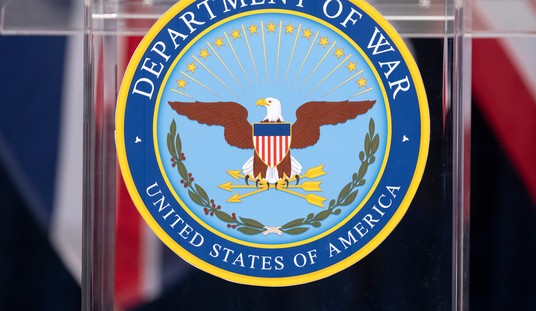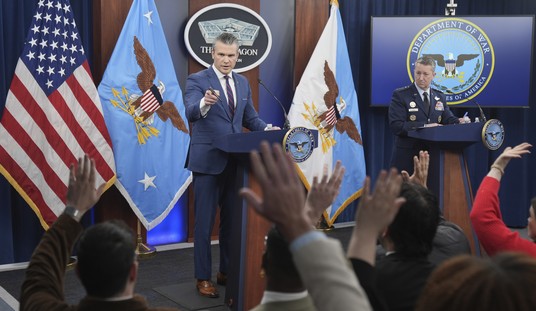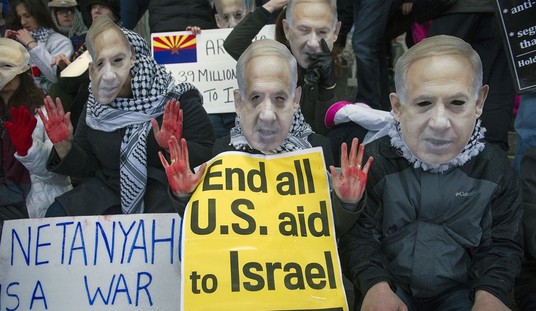
People watch a TV screen showing North Korean leader Kim Jong Un at the Seoul Railway Station in Seoul, South Korea, Wednesday, March 7, 2018. After years of refusal, North Korean leader Kim Jong Un is willing to discuss the fate of his atomic arsenal with the United States and has expressed a readiness to suspend nuclear and missile tests during such talks, a senior South Korean official said Tuesday. Korean letters read: “Positive evaluation for denuclearization of North Korea.” (AP Photo/Ahn Young-joon)
There has been a lot of talk lately about an offer ostensibly made by the North Koreans to enter into talks with the United States:
During the envoys’ two-day visit to Pyongyang, the North’s capital, which ended on Tuesday, the two Koreas also agreed to hold a summit meeting between Mr. Kim and President Moon Jae-in of South Korea on the countries’ border in late April, Mr. Moon’s office said in a statement.
“The North Korean side clearly stated its willingness to denuclearize,” the statement said. “It made it clear that it would have no reason to keep nuclear weapons if the military threat to the North was eliminated and its security guaranteed.”
If the statement is corroborated by North Korea, it would be the first time Mr. Kim has indicated that his government is willing to discuss relinquishing nuclear weapons in return for security guarantees from the United States. Until now, North Korea has said its nuclear weapons were not for bargaining away.
“The North expressed its willingness to hold a heartfelt dialogue with the United States on the issues of denuclearization and normalizing relations with the United States,” the statement said. “It made it clear that while dialogue is continuing, it will not attempt any strategic provocations, such as nuclear and ballistic missile tests.”
There is absolutely nothing new in this offer.
The historic position of North Korea has been that its nuclear weapons are a direct response to a) the presence of U. S. forces in South Korea and b) joint U. S. and ROK exercises which it claims are rehearsals for offensive operations against North Korea. Never mind that both those facts existed for some 50 years before North Korea tested its first nuke.
What the North Koreans are demanding for denuclearization is a removal of U. S. forces and an end to exercises. At that point we get negotiations. This kind of utter bullsh** produced by the Washington Post is wrong at virtually every level and it isn’t just me saying so.
First of all, it bears saying that core of the North Korean denuclearization offer—that it would have “candid talks” with the U.S. over its nuclear weapons as long as the country’s security is guaranteed—is not new. In fact, the day after Kim Jong-un oversaw the first-ever successful flight-test of the new Hwasong-14 intercontinental-range ballistic missile last year, he was quoted in North Korea’s Korean Central News Agency as saying that his country “would neither put its nukes and ballistic rockets on the table of negotiations in any case nor flinch even an inch from the road of bolstering the nuclear force chosen by itself unless the US hostile policy and nuclear threat to the DPRK are definitely terminated.”
The denuclearization offer, as paraphrased by Chung Eui-yong, the chief of South Korea’s National Security Office, mirrors that basic North Korean offer, which has been on the table for years. It’s the centerpiece of Kim Jong-un’s longer term plan to wedge and decouple the United States and South Korea.
Where precisely the “hostile policy” begins and ends is up for debate, but it’s difficult for me to imagine a scenario where it doesn’t include the pullback of U.S. extended deterrence assurances to Seoul and, most likely, the complete withdrawal of forward-based U.S. troops on South Korean soil. A more maximalist reading of the “hostile policy” may even include U.S. forces in Japan and, if an editorial in Rodong Sinmun published after the South Korean statement is to be taken at face value, the denuclearization of the United States!
Making the offer even more suspect and more likely just a mind-f*** being played by Kim Jong Un on South Korea President Moon Jae-in is the fact that the sole source for the offer is the word of a single South Korean diplomat who is passing on what he was told by his North Korean counterpart. North Korea has not publicly acknowledged that an offer exists:
What’s striking so far is that North Korea simply hasn’t authoritatively restated or corroborated the majority of what Chung announced on Tuesday to so much global fanfare. North Korean state media has extensively reported on the inter-Korean meetings, but has not clearly stated Kim Jong-un’s intention to enter exploratory talks with both his nuclear weapons and the United States’ “hostile policy” on the table. An inter-Korean joint statement after the latest round of talks in Pyongyang could have obviated some of this uncertainty about where Pyongyang stands.
This puts the Moon administration in an unenviable position, with its word being the only real source of optimism right now that some talks can go forward. If North Korea ultimately reneges, Moon is left embarrassed, facing an irascible ally disinterested fundamentally in engagement without precondition and committed to “maximum pressure.”
For any talks to proceed, H.R. McMaster, Nikki Haley, Rex Tillerson, and James Mattis…not to mention Donald Trump…all have to do a major walk-back of their stated policy which is that talks with North Korea are only possible after it gives up its nuclear weapons.
Secretary of State Rex Tillerson on Friday called on Russia and China to sever their economic pipeline to North Korea, and said Pyongyang must “earn its way back” to negotiations by ceasing missile tests for a sustained period.
Speaking at the United Nations Security Council in a session called for foreign ministers, Tillerson backpedaled from a position he outlined earlier this week. In New York, he did not repeat an assertion he made Tuesday that the United States has no preconditions to starting talks. That remark was undercut by the White House, which said there had been no change in position.
Tillerson said Friday that any talks must be preceded by a “sustained cessation of North Korea’s threatening behavior,” and the United States will continue to ask countries to step up their efforts to isolate the regime and starve it of cash by adhering to sanctions.
“North Korea must earn its way back to the table,” he said. “The pressure campaign must, and will, continue until denuclearization is achieved. We will, in the meantime, keep our channels of communication open.”
…
“The international community remains firm in our determination that we will not accept a nuclear North Korea,” Tillerson said.
That position could by itself preclude any negotiations. Pyongyang has been adamant that it will never even consider abandoning its nuclear weapons program.
“The DPRK has a choice,” said Tillerson, using the acronym for North Korea’s official name, the Democratic People’s Republic of Korea. “It can reverse course, give up its unlawful nuclear weapons programs, and join the community of nations, or it can continue to condemn its people to poverty and isolation.”
Given that Trump doesn’t do walk-backs all that graciously, I’d rate the chances of that happening as remote.
Extra sanctions are beginning to hurt the North Korean elite. By October, it is estimated that North Korea will have exhausted its hard currency reserves. And, as if to underscore the idea that there are preconditions to any talks, the U. S. and South Korea announced that the readiness exercises postponed for the duration of the Winter Olympics will continue:
Annual U.S. and South Korean military exercises could begin as early as the end of this month, say three U.S. defense officials.
Foal Eagle, a yearly exercise with the South Korean military, is now scheduled to begin on March 31 and run through May. The exercise, which the U.S. military describes as defensive in nature, involves thousands of U.S. troops conducting ground, air, naval, and special operations field exercises.
The exercises are usually conducted in March and April, but in December South Korean President Moon Jae-In told NBC News his country was pushing the U.S. to postpone the exercises until after the Winter Olympics and Paralympics in PyeongChang, which end March 18, as an olive branch to North Korea.
The message is loud and clear. Absent convincing evidence that North Korea has agreed to give up its nuclear weapons program, the pressure is going to continue to be applied.













Join the conversation as a VIP Member